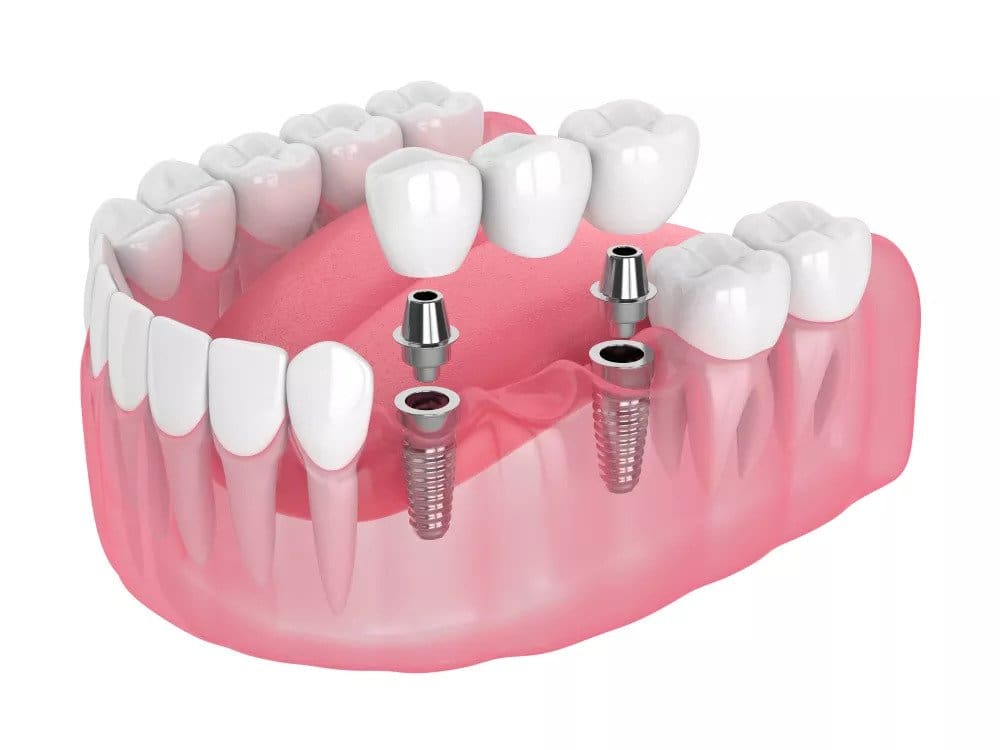Dental Implants
Dental implants are advanced tooth replacement solutions that restore the function and aesthetics of missing teeth. Comprising a titanium post surgically embedded into the jawbone, dental implants are artificial roots that provide a sturdy foundation for crowns, bridges, or dentures. This integration with the jawbone, known as osseointegration, allows implants to mimic the stability of natural teeth.
Unlike traditional dentures, which can slip and cause discomfort, dental implants offer a permanent and secure solution that can last many years with proper care. Ideal candidates for dental implants typically have sufficient bone density and healthy gums, and the procedure involves several stages, including initial consultation, surgical placement, healing, and fitting of the prosthetic tooth. Dental implants significantly improve oral health, enhance speech and chewing capabilities, and boost self-esteem by restoring a natural-looking smile.

Types of Dental Implants in Yucaipa, CA
Endosteal Implants
Endosteal implants are the most commonly used type of dental implant. They are titanium posts or screws that are surgically placed into the jawbone. Once the implant integrates with the bone, a crown, bridge, or denture is attached. These implants are suitable for patients with adequate jawbone density and are often used to replace single or multiple teeth.
The Process of Getting Dental Implants in Yucaipa, CA
- The journey begins with a thorough consultation with our dentist in Yucaipa, CA. During this visit, the dentist assesses your overall dental health, reviews your medical history, and conducts a detailed examination, which may include X-rays or CT scans. This evaluation helps determine whether you have sufficient jawbone density and identifies any underlying issues that need to be addressed before the implant procedure.
- Once the evaluation is complete, a personalized treatment plan is developed. This plan outlines the number of implants needed, their placement, and the type of replacement teeth used. Our dentist will discuss the plan with you, including the expected timeline, potential risks, and post-surgery care.
- The next step is the surgical placement of the dental implants. This procedure is typically performed under local anesthesia, though sedation options are available for anxious patients. The dentist places a titanium post into the jawbone where the missing tooth was located. Over time, the bone fuses with the implant in a process called osseointegration. This fusion is crucial for the stability of the implant.
- After the implant is placed, a healing period of several months is required to allow for osseointegration. During this time, a temporary crown or bridge may be provided to protect the implant site and maintain functionality. Regular follow-up visits are essential to monitor the healing process and ensure the implant integrates well with the bone.
- Once the implant has fully integrated with the jawbone, a second minor surgery is performed to attach an abutment to it. The abutment is a connector piece that holds the final restoration, such as a crown, bridge, or denture. After placing the abutment, our dentist may take impressions of your teeth to ensure a precise fit for the final restoration.
- The final step involves placing the permanent restoration onto the abutment. This restoration is custom-designed to match your natural teeth in color, shape, and size. Once the final restoration is in place, adjustments may be made to ensure proper alignment and bite.
- With the dental implants successfully placed and the restoration complete, maintaining good oral hygiene is crucial for the longevity of the implants. Regular dental check-ups, professional cleanings, and at-home care routines will help ensure the health and durability of your dental implants. Contact us today to learn more.
Dental Implants and Oral Health in Yucaipa, CA
Preservation of Jawbone Density
One of the primary benefits of dental implants is their ability to preserve jawbone density. The underlying bone can deteriorate when a tooth is lost due to the lack of stimulation. Dental implants act as artificial tooth roots, providing the necessary stimulation to the jawbone, which helps maintain its structure and density over time.
Prevention of Teeth Shifting
Missing teeth can cause adjacent teeth to shift into the empty space, leading to misalignment and bite issues. Dental implants fill the gap left by missing teeth, preventing the remaining teeth from shifting and ensuring the bite remains appropriately aligned. This helps in maintaining proper dental occlusion and reduces the risk of developing bite-related problems.
Improved Oral Function
Dental implants function like natural teeth, allowing for efficient chewing and speaking. Unlike dentures, which can sometimes slip or require adhesive, implants provide a stable and secure solution that restores full chewing function. This can lead to better digestion and overall nutritional health as you can comfortably eat a wider range of foods.
Enhanced Aesthetics
Dental implants in Yucaipa, CA, are designed to closely mimic the appearance of natural teeth. The crowns placed on implants are custom-made to match the color, shape, and size of surrounding teeth, resulting in a natural and aesthetically pleasing smile. This not only boosts confidence but also contributes to a positive self-image.
Maintaining Facial Structure
Missing teeth can lead to changes in facial structure, including sagging and premature aging. Dental implants help maintain the natural contour of the face by providing support for the surrounding bone and tissues. This helps preserve facial features and prevents the sunken appearance often associated with tooth loss.
Dental implants provide a comprehensive solution that supports and enhances oral health, contributing to a functional, aesthetically pleasing, and long-lasting outcome. Visit Calimesa Dental at 34636 County Line Rd #19, Yucaipa, CA 92399, or call (909) 795-2585 to book your consultation and learn more about the benefits of dental implants.
All-on-X Full Mouth Implant Restoration
Clear Aligners
Cosmetic Dentistry
Restorative Dentistry
Preventative Dentistry
Emergency Dentistry
Dentures
Sedation Dentistry (Nitrous Gas/ Laughing Gas Only)
Wisdom Teeth Removal
Digital Dentistry
Biomimetic Dentistry
Dental Checkups and Cleanings
Custom Teeth Whitening
Veneers
Location
34636 County Line Rd #19,
Yucaipa, CA 92399
Office Hours
MON - WED8:00 am - 5:00 pm
THU8:00 am - 4:00 pm
FRI - SUNClosed
